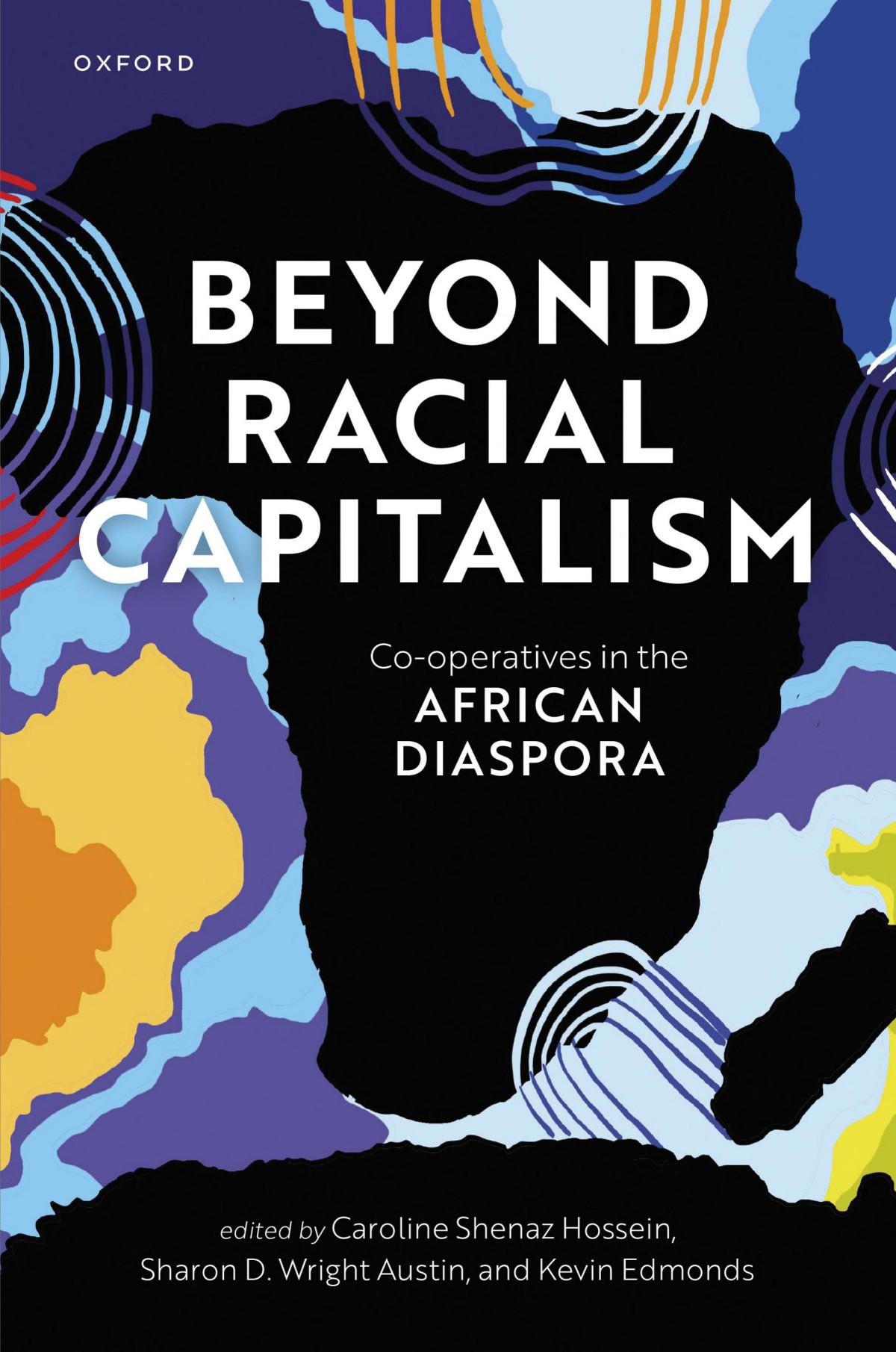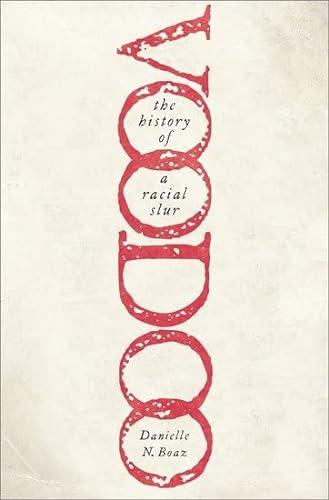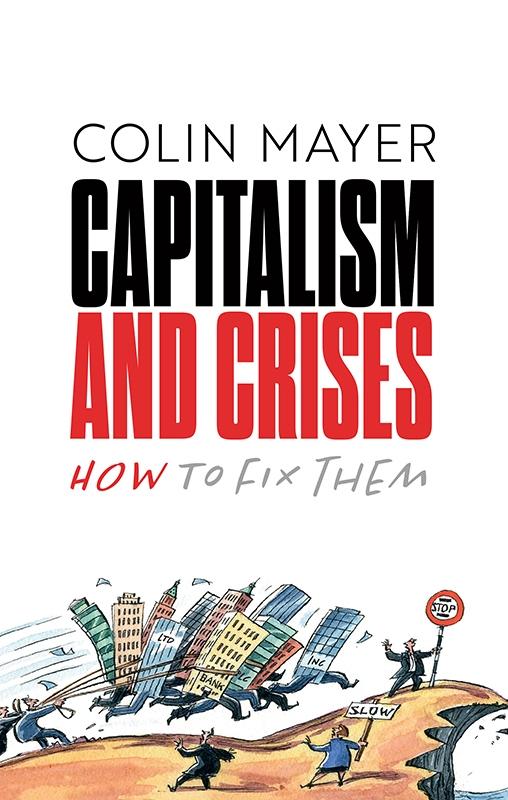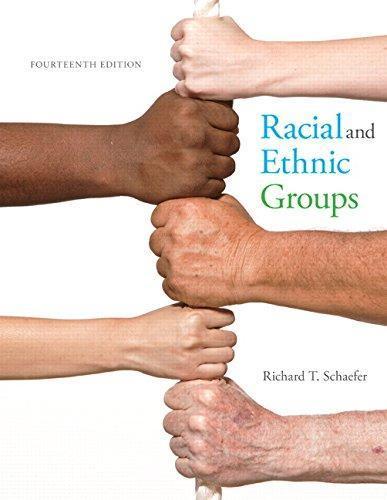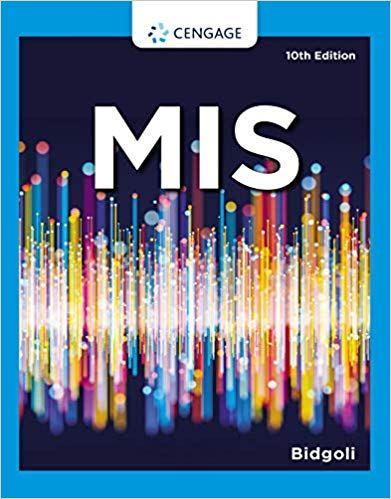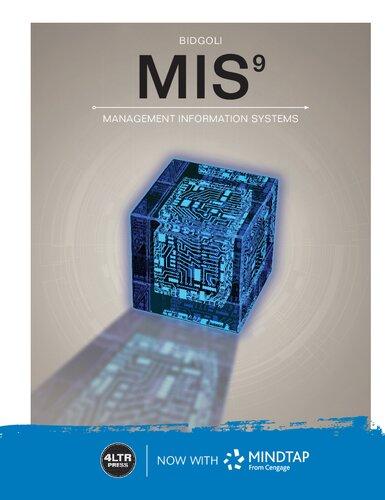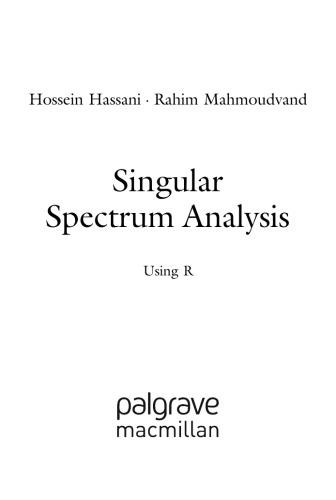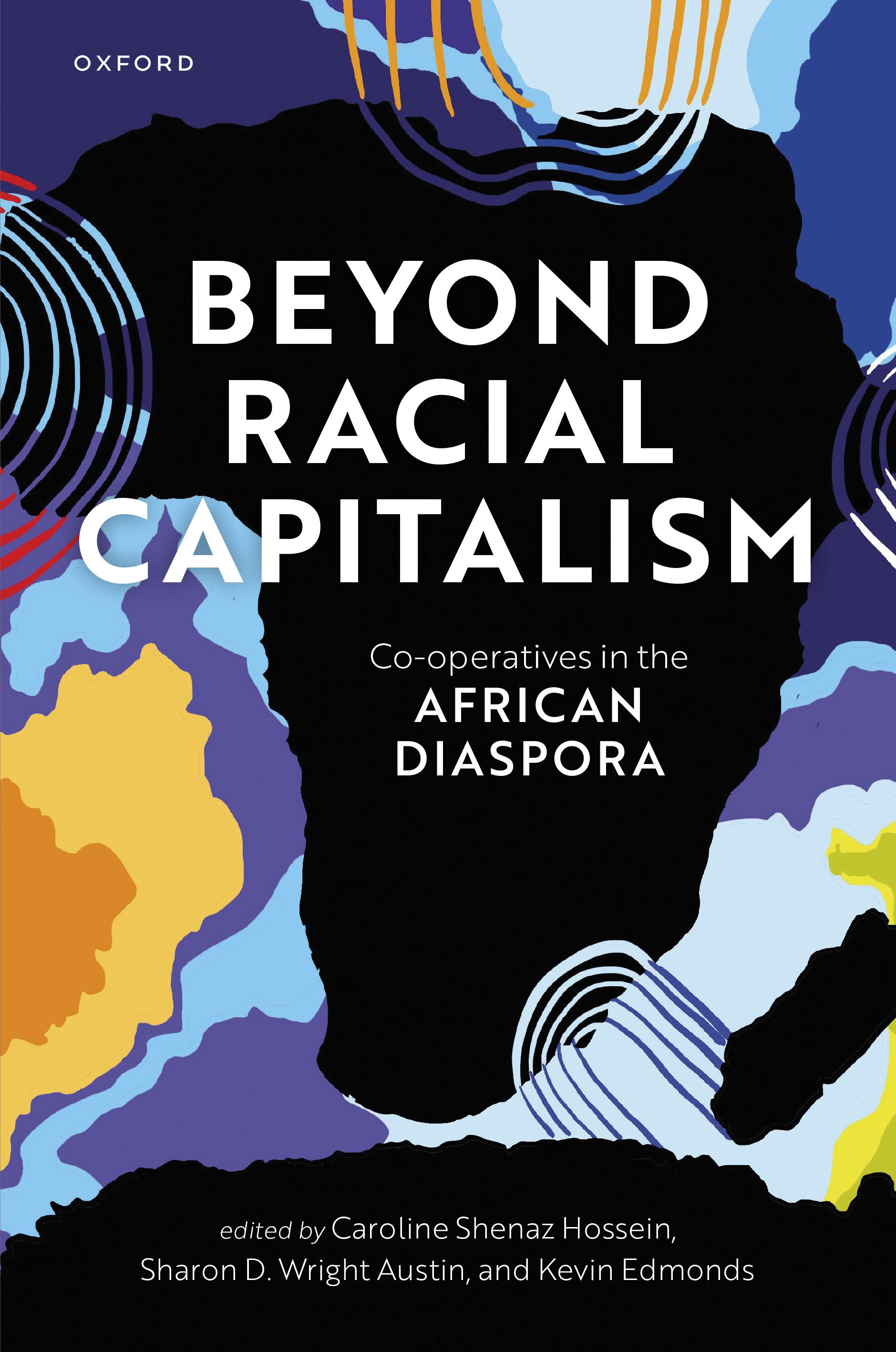Beyond Racial Capitalism 1st Edition Hossein
Visit to download the full and correct content document: https://ebookmass.com/product/beyond-racial-capitalism-1st-edition-hossein/
More products digital (pdf, epub, mobi) instant download maybe you interests ...
Voodoo: The History of a Racial Slur 1st Edition Boaz
https://ebookmass.com/product/voodoo-the-history-of-a-racialslur-1st-edition-boaz/
Capitalism and Crises 1st Edition Colin Mayer
https://ebookmass.com/product/capitalism-and-crises-1st-editioncolin-mayer/
MIS8 : management information systems Hossein Bidgoli
https://ebookmass.com/product/mis8-management-informationsystems-hossein-bidgoli/
Racial and Ethnic Groups (14th Edition ) 14th Edition
https://ebookmass.com/product/racial-and-ethnic-groups-14thedition-14th-edition/
(eTextbook PDF) for MIS 10th Edition by Hossein Bidgoli
https://ebookmass.com/product/etextbook-pdf-for-mis-10th-editionby-hossein-bidgoli/
MIS 10 - Management Information Systems 10th Edition
Hossein Bidgoli
https://ebookmass.com/product/mis-10-management-informationsystems-10th-edition-hossein-bidgoli/
MIS 9: Management Information Systems 9th Edition
Hossein Bidgoli
https://ebookmass.com/product/mis-9-management-informationsystems-9th-edition-hossein-bidgoli/
Singular Spectrum Analysis using R Hossein Hassani
https://ebookmass.com/product/singular-spectrum-analysis-using-rhossein-hassani/
Film, Negation and Freedom: Capitalism and Romantic Critique Will Kitchen
https://ebookmass.com/product/film-negation-and-freedomcapitalism-and-romantic-critique-will-kitchen/
BeyondRacialCapitalism
BeyondRacial Capitalism
Co-operativesintheAfricanDiaspora
Editedby CAROLINESHENAZHOSSEIN
SHAROND.WRIGHTAUSTIN KEVINEDMONDS
GreatClarendonStreet,Oxford,OX26DP, UnitedKingdom
OxfordUniversityPressisadepartmentoftheUniversityofOxford. ItfurtherstheUniversity’sobjectiveofexcellenceinresearch,scholarship, andeducationbypublishingworldwide.Oxfordisaregisteredtrademarkof OxfordUniversityPressintheUKandincertainothercountries
©OxfordUniversityPress2023
Themoralrightsoftheauthorshavebeenasserted
Allrightsreserved.Nopartofthispublicationmaybereproduced,storedin aretrievalsystem,ortransmitted,inanyformorbyanymeans,withoutthe priorpermissioninwritingofOxfordUniversityPress,orasexpresslypermitted bylaw,bylicenceorundertermsagreedwiththeappropriatereprographics rightsorganization.Enquiriesconcerningreproductionoutsidethescopeofthe aboveshouldbesenttotheRightsDepartment,OxfordUniversityPress,atthe addressabove
Youmustnotcirculatethisworkinanyotherform andyoumustimposethissameconditiononanyacquirer
PublishedintheUnitedStatesofAmericabyOxfordUniversityPress 198MadisonAvenue,NewYork,NY10016,UnitedStatesofAmerica
BritishLibraryCataloguinginPublicationData
Dataavailable
LibraryofCongressControlNumber:2022935474
ISBN978–0–19–286833–6
DOI:10.1093/oso/9780192868336.001.0001
Printedandboundby CPIGroup(UK)Ltd,Croydon,CR04YY
LinkstothirdpartywebsitesareprovidedbyOxfordingoodfaithand forinformationonly.Oxforddisclaimsanyresponsibilityforthematerials containedinanythirdpartywebsitereferencedinthiswork.
TothepeoplewhobravedtheCOVID-19pandemictostandupandspeakout againstanti-Blackracismwhilewearingtheirmasksduringthesummerof2020. Thiswasacollectivemovementwherepeoplewhocaredaboutendinganti-Black racismcametogethertomakesuretheirvoiceswereheard.Theglobal co-operativesectorshouldbetakingnotesonhowtoculturallydiversifyandto startseeinginformalBlackco-operativesystemsofallkindsaspartofthe co-operativeidentityandsector.
Foreword
TiffanyWilloughby-Herard
BeyondRacialCapitalism:Co-operativesintheAfricanDiaspora,editedbyCaroline ShenazHossein,SharonD.WrightAustin,andKevinEdmondsforOxford UniversityPress,bringstogetherBlackandracializedscholarswhoexplorepoliticaltheoristCedricRobinson’sconceptualizationof“racialcapitalism”inorderto bringitintostudiesoftheBlacksocialeconomyaslivedandcreatedthroughouttheAfricandiaspora.Contributorsplacethe“Blackradicaltradition”,simply describedas“therefusaltoacceptlifeincaptivity”andtheforcethatwillsus tocreatemaroonagespacesinconversation,withwritingsbyexemplaryfeministpoliticaleconomistsincludingNinaBanks,CarolineShenazHossein,Jessica Gordon-Nembhard,andH.L.T.QuantodemonstratethattheBlacksocialeconomy isessentialtotheBlackradicaltraditionhistoricallyandconceptually.ContributorsexplainthatfugitivityitselfhasreliedondimensionsofBlackco-operative economics.
Co-operativethinkingandpracticeenabledBlackpeopletosabotagethecoercive natureofslaveryitselfandtoweakenthemarketeconomythatfollowedinits“afterlife”and“second”life(Tomich2003; Hartman2007).Suchcooperativethinking prioritizedaffirmingtheself-determinationandinherenthumanityofthosedeemed naturalandinherentslaves.IntheeconomicorderoftheBlacksocialeconomy,cooperationperformedanalchemyofsocialreality:turningbondspeopleintofreepeople, turningplantationsintosustainablesmall-scalefood-independentcommunities,and turningpredatorycreditandlendingmarketsintomember-ownedfinancialunions. White-ledsocial,legal,juridical,electoral,educational,andeconomicinstitutions engagedinlegallyprotectedconspiraciestoextractandaccumulatewealthandto demandthetributeofrelentlessandagonizingformsofhumiliationfromgenerations ofenslavedandcolonizedpersonsandtheirdescendants.
Inthefaceofthisonslaught,Blacksocialeconomiesusedcooperationofadifferentandhigherethicalordertorestoreandrecapturethehumanandeconomicvalue thatwasbeingsiphonedofffromBlackpeople—forthebenefitofthoseverypeople.Cooperativeeconomicsthenusedthesociallyconstructedrulesandregimens aroundexchange,trade,andvaluetoconcretizeBlackrightsandtoestablishboundariesaroundwhatcouldbestolenfromBlackpeople.RatherthanfocusonBlack belonginginthecivicsphere,BlacksocialeconomiesinvitedBlackpeopletoaffirm theirworththroughthethingsthatcouldbelongtoBlackpeople.Economicindependencedefinedasowninglandandgrowingfoodandcooperatingwasanessentialpart ofthetoolkitforsurvivingandresistingthewhitewilltomakeBlackpeopleintothe
chattelpropertyofothers.TheprinciplesthatguidecooperationintheBlacksocial economyhavebeenrelevantfromslaverytothepresentbecausethisdecisiontodo violencetoBlackvalueanimatestheonlyconstantinthewhitelibidinaleconomy.
ExclusionandErasure
ThecontributorsareconcernedaboutthedeliberateexclusionofBlackandother racializedpeoplefromhistoriesofthecooperativemovement(solidarityclubs,rotatingsavingsandcreditassociations,mutualaidsocieties,informalgroupswellknown aroundtheworldindozensoflanguages) and fromformalfinancial,micro-credit, andlendinginstitutions.Bothformsofexclusion—fromknowledgeproductionand institutions—contributetoamythologyofwhitenessandEuropeannessasinherentlyentrepreneurial,thrift-oriented,andfocusedoneconomicadvancementand individualwealthaccumulation.Suchfictitious“forger[ies]ofmemory,”toturnto another Robinson(2007) conceptusedtodefinetheporousanditerativenature ofracialregimes,isthecornerstoneofgraveinjuriesfacedbyBlackandracialized communitiesinNorthAmerica.Theseinjuriesresultinnewformsofcriminalizationofracializednewcomersthatrepeattheformsofcriminalizationthatarethe institutionalandideologicalbackboneofgenerationsofslavery,post-slaveryera genocide,andlandtheftfromBlackandIndigenousfarmersintheOldandNew Worldcolonies—Ireland,Canada,theUnitedStates,theCaribbean,andCentral America.
Mappingcooperativesamongracializedandcolonizedpeopleisimportant becauseenslavedpersonsandcontemporaryBlackandracializedmigrantsarefrom placeswherethesesocialeconomicorganizationsarewidespreadandrecognizable ascornerstonesofgenuine(albeitmarginalizedandevencriminalized)democracysustainingeconomictransformation.Moreover,suchdocumentationdisabusesthe notionof“WhiteCanada”whichCanadianfeministculturalgeographerKatherine McKittrick(2006) hassocarefullyexcavated.McKittrick’sBlackRadicalTradition historiographyusesthedemolitionanderasureofBlackplaceandspaceinCanada asyetanotherexampleofthemanufactureofwhitesettlercolonieswhicharealleged tobedestinedforeconomicprosperitybecausetheyarepopulatedbydemographics whitenedbybeingallowedtodoheinousandmurderousgenocidetoIndigenous, Africandescendant,andracializedpopulations. McKittrick(2006) illustratesexactly thefashionthroughwhichthesewhitesettlercoloniesonlybecomepossibleasdemocraticnationsthroughdisappearingBlackandracializedpersonswhoarebuilding andsustainingsurvival-focusedsocialeconomies.
AsexplainedinthePrefacetothisbook,suchwhitenationalistideologiesexist throughrepressinghistoricalaccountsofthe“risksthatBlackpeopletake[andhave taken]tohumanize[the]economy”whilebeingstigmatizedasagentsofeconomic undevelopmentandfinancialfailure.Further,theseerasurescreateamythological whitecooperativeculturethatresultsincaricaturesofBlackpeopleaseconomically
insignificant,incapable,andbackward.UsingRobinson’smethodofalonghistorical accountoftheeconomiclifeoftheenslavedandtheirdescendantsfromtheAmericas and theirdescendantsfrompostcolonialAfrica,theCaribbean,LatinAmerica,and SoutheastAsiamarksyetanotherwayinwhichsuper-developmentintheGlobal NorthhasbeendependentonthepeopleandideasoftheGlobalSouth.
AntiqueLegaciesandCulturalResources
Havingframedtheproblem,theauthorsoffercarefullyrenderedcasestudiesthat demonstratenotjustentrepreneurshipbutalsoasystemofdynamicculturalvaluesaroundwhatwealthis,whatitisfor,andhowAfrican-descendedcommunities definemoneyandfinanceascollaborativesocialprojectsthat“canproduceresistant andtransformativeapproachestosociety.”InChapter4,contributorsPatriciaCamposMedina,ErikaNava,andSolAramendirevealthatBlackandIndigenoussocial economiesexisttocreateasenseofcommunitythatallowsracializedmigrantsto developcollectiveandpluri-vocalvocabulariesforidentifyingtheformsofeconomic exclusionthattheyface,createalternativefinancialpathways,andmakemeaning withthenextgenerationssothattheycancreateabaseforchallengingtheextant conditions.
Readerslearnthat“cooperativeeconomicdevelopmentforBlackliberationis notanewconcept”(seePreface).AsRobinsonexplains,Africanssubjectedtothe barracoonsandMiddlePassagewerenot“emptycargoes.”Africanandotherracializedpeopleinthepastandthepresentbroughtpro-socialdefinitionsofeconomic lifesuchasmutualismandcollectivitywiththem.Braidedintothesemioticsof greetings,gestures,namingpractices,ritesofpassage,andwaysofrespondingto catastrophicenvironmentalandpublichealthdisasterslikeimperialisminthepast andCOVID-19inthepresentwerepropheticvisionsthatresultedindistinctive beliefsystems.AccordingtoHossein,Edmonds,andAustinintheIntroduction, thesebeliefsystemsinclude“beingincommunityisessentialtoone’slife”andvalues suchas“trust,reciprocity,andself-help”.Suchprinciplesenabledmaking“conscientiousdecision[s]tooptforhumanecooperativesystemsdespitethehardships theyencounter[ed]”andrequiredpracticalcommitmentsto“decolonizeeconomic institutionsandsitesoforganizations”(seeIntroduction).
TheeditorstraceculturalresourcestoAfricanantiquityandtonotionsofexchange andtradeasenrichingparticipantsininteractionsinsteadofusingusury,trickery,orfraudtohoardvaluewhilereducingotherpeople’slabor,skills,insights, beliefs,orproductstolessthannothing.Thisproduces“equitableworkintheeconomy”andasocialeconomythatisdistinctive,thatisresilienttoglobalworldcrisis, andthatstrivesforethicalandmoralhighgroundthroughdisavowingdispossession,theft,enslavement,exploitation,extortion,andstealingthelivelihoodsof thepoortobenefittherichandprotected(seePreface).Sowhilehostilereaders mayrecoilattheidentitariandescriptionsofthesestrategicallydeployedcollective
culturalresourcesas“instinctive”and“ancestral”and“hereditary”theauthorsare usingculturetodescribedefinitionsofeconomicwell-beingthataredurableand long-lastingandwhichconstitutewaysofbeingandwhatOyèrónkéOyĕwùmí(2001) called“worldsense.”
BeyondRacialCapitalism drawsreadersintothelivedexperiencesofthefounders andsustainersofcollectivisteconomicsocialityandtowarddynamiceconomicrelationswhoseaimisthedevelopmentofallinsteadoftheprotectionandinsulation ofthosewhobenefitmostfromunregulated“invisible”anthropomorphizedmarket relations.Inordertomakesuchclaimsaboutalternativevisionsforwhataneconomyexistsfor,authorsmustdetailthemyriadwaysinwhichactualracializedpeople havebuiltsucheconomicsocialrelationsinthefaceoferasureandenclosure.Each caseturnstowardpremodern,precolonial,andeighteenth-andnineteenth-century macroeconomicquestionsaboutthenatureofslavery,captivity,forcedmigration, andtherelatedmismanagementandmanipulationofcommonglobalresources thattodaystillcreateextraordinarywealthforsomeandgrindingpovertyfor others.
SecrecyisSurvival
Readerswhoareseekingliberatorypotentialandradicalresistanceineverysocial phenomenonwillmakethemistakeofattemptingtogeneralizethepromisesofsurvivalintheBlacksocialeconomytotherestoftheworld.Iwilladmittogenuinely wantingtoseethistextasahandbookforreconsideringthecommonsandbreakingracialcapitalismfullstop.AminaMamaandAdoteyBing-Pappoe’sChapter5, however,cautionsagainstmyowndesireasareadertogeneralizetheBlacksocial economy.MamaandBing-Pappoedescribehowthesocialvisionsthatanimatethe Blacksocialeconomymaynotbetransferabletopeoplewhoseracializationhistory hasnotbeenmadebybecomingthechattelhumancommoditiesofenslavement, colonialism,andgenocide.
RathertheBlacksocialeconomyhascontendedagainsttheuniversalizingtendenciesofracialcapitalismthroughbuildingpurposefullyinternalandsmallcommunitiesofpeoplewhoknowandtrusteachotherandwhocanexertsocialinfluenceon eachotherthroughtheirmanysharedrolesandrelationships.Thus,thecontributors are“goingbeyond”racialcapitalismbyvisioningandpracticingadifferentwayto organizeeconomicandsociallifeoutsideofandinantagonismtotheracialcapitalismthatrecreatesslavery,secondslavery,exclusion,marginalization,anddevaluing Blackandracializedpersonsandcommunitiesinordertoextractwealthandaccumulatevalue.Thesignatureexampleofthenecessityoftrustandsecrecyisthe UndergroundRailroadasaninformalcommunityofpeoplemostoftenunknown toeachotherwhoengagedincriminalizedcivildisobedience.
Byrecognizingthesovereigntyoffugitivesdeterminedtoescapethemonetaryjuridicalregimeofslavery,abolitionistsamongthefreeandenslaved(documented
andundocumented)“committedtodemocracyandshare[d]decision-making. Buildingconsensusandpracticingcollectivegovernancebuil[t]cohesion”amongthe contrabandwhosesecrecywasacriticalpartofsurvival(Hosseinetal.,Introduction). TheriskstheytooktogethertoescapewereyetanotherMiddlePassage,albeitone inwhichthesocialeconomythattheybuiltwasnotreliantonschemesthatsimplyproduced,farmed,andfinanceddebt.Theseoriginsofasocialeconomyrequire inheritingpracticesofresistanceandthewilltoretellstoriesoftheoriginsofcommercialpowerin[the]theftofAfricanpeoplewithoutguaranteesthatsuchtestimony ormemorywouldguaranteefreedomfromnewformsofviolence,restitution,reparation,ormainstreamtruth-tellingabouttheracistroutesofcapitalisteconomic exchange.
Thoughaccusedofbeingsecretive,stigmatizedascoversforillicitformsofcriminalizedexchange,anddisregardedforbeinggroundedinAfricanculturalretentions anoppressedpeopleseekrefugeandmobilizetogetherbecauseoftheirmutual understandingofthehazardsinsocietyandthehistoryofwhitesabotage.Secrecy, maroonage,andfugitivitybecometheimpetusforformsofsurvivalanddefinitions ofselfhood/development/andgrouptransformationthatare:(1)steepedinUbuntu, (2)categoricallyantitheticaltoEurocentricdefinitionsofself/economicdevelopment/andgrouptransformation,and(3)notweddedtodebtfarmingtomediatethe catastrophiceffectsofdislocation.
BuildingFuturesinthePresent
WhenparticipantsintheBlacksocialeconomyacknowledgeandrespondtoenslavement,landtheft,andtheglobalracialwealthdividewithobligationstoliftand improvetheconditionsofentirepeoples,wearewitnessingawilltocollectivize ontheirownterms.Eventheconstructionofthistextthatthinksracializedand Indigenousmigrantsinthesameframeasdescendantsofenslavedpersonspoints tocollectivizingontheirownterms—againfollowingadistinctivelyRobinsonian approachtopoliticaleconomy.Racializedmigrantscraftcommunaleconomicstrategiestosurviveoppressiveeconomicconditionsthatarestructuredtoincorporate themintothemostdangerous,poorlyremunerated,legallyunprotected,exploitativeandextraction-prone,andunhealthypartsoftheessentialworkforceofthe wealthypartsofanysociety.Employers,neighbors,andcivilspherestatefunctionariesoftenimplementinstitutionalizedracializedimmigrationbias,linguisticracism, andpettygenderedxenophobiaregardlessoftheemploymentstatus,educationlevel, orpersonalhistoryofmigrants.
Thenormativeexperienceofracializedmigrantsisbeingsubjectedtodiscriminatoryfinancialandlendingsystemswhilealsobeingbaitedabouttheirresponsibility tointegratedespitethemanyracialbarriers.NigerianimmigrantsturntotheageoldAjosystemasasolution.ThroughAjo,Nigerianimmigrantsgainaccesstobulk financestoinvestindifferentavenues—suchasfinancialinstruments,businesses,
anddownpaymentsforhouses—thataidtheirincorporation(takenfromOlawoyeMann’sChapter2).
Suchbaitingisnotinconsequentialasitformstheactualpathtoabrokenand damagedbelongingevidencedinthelonghistoryofthoseAfricanandIndigenous peoplewhohavewitnessedtheircitizenshiprightsintheAmericasbeparadigmaticallydescribedinDr.MartinLutherKing’s(1963)heartbrokenwordsas“a badcheck.”InTatianaBenjaminandSharonD.WrightAustin’sChapter3,they note:“EvenasBlackwomenadvanceeconomicallyandsocially,theyarestillfacing inadequateservicesthatdonotaccountforracialandgenderdisparities.”Further, BenjaminandAustinfindgovernmentandotherstateagencieshavebeencreated torectifyhistoriesofbiasedlendingandprohibitionofBlackcommercialenterprise havetakenupacolor-blindideologythatpropsupandrevisespre-CivilRightsEra justificationsforharmingBlackandracializedcommunities.Thishasresultedinthe discontinuationofpoliciestoimproveconditionsforAfricanAmericansinfavorof thesamemeagereconomicinterventionsbeingspreadacrossthemanyprofound needsbyallracializedpeoples.
Thus,agenciesgatherdatathatstreamlines“efforts”thatdonotactuallypullup therootsofracialcapitalism.Ultimately,theconditionsthatmakedefraudingBlack andracializedpeoplethroughracialcapitalismenableracialliberalprogressinstead offundamentalchange.Thecontributorsaredemandingamove“beyondracial capitalism,”notsimplyaccommodationwithorminimallegalregulationofracial capitalism.Ratherthantransformingtherulesofthegame,BenjaminandAustin identifyaninstitutionalizedconstraintthatgaslightsnon-migrantpeopleofcolor. Ifthesecommunitiesdonotdefinetheirbelongingsolelyandprimarilythrough championingtheeconomicneedsofracializedmigrants,thedomesticformsofdiscriminatoryandultimatelymorallybankruptlendingandfinance(forracialized people)simplygetextendedtoracializedmigrants—whosemigrationwascompelled throughtheinternationalvariantofthesameformsofblatantlydiscriminatoryglobal currencymanipulationandfinancialspeculation.
AmongthemanythingsthatIfindcompellingaboutthesecontributionsisthat theyhavecarefullybeencuratedtoavoidthemoreobviousdivide-and-conquer rhetoricsnecessarytopropupwhiteminorityruleintheracially,ethnically,and culturallydiversesocietiesoftheAmericasandtheOldWorldColonies.Indeed, bylinkingthehistoriesofeconomicproblem-solvingandcooperativebuildingin migrantandnon-migrant racializedcommunities,thecontributorsandeditorshave steppedawayfromcompetingethnicinterestsandtheindividualismthatunderwrite thoseshort-termpoliticalsolutions,infavorofanuancedandsophisticatedaccount offormsofanti-capitalistethics. BeyondRacialCapitalism drawsontheresourcesof heritageincludingeconomicrelationstobuildsustainablesocialtiestowardasocial visionofeconomicandfinancialfugitivityforIndigenous,migrant,racialized,and Blackpeople.
Irvine,California 12December2022
WorksCited
Atkins,K.1993. TheMoonisDead!GiveUsOurMoney!TheCulturalOriginsofanAfrican WorkEthic,Natal,SouthAfrica,1843–1900.London:Heinemann. Benjamin,T.andAustin,S.D.W.Chapter3,“TheBlackSocialEconomy:BlackAmerican WomenUsingSusuandCo-operativesasResistance.”
Bing-Pappoe,A.andA.Mama.Chapter5,“RoutesoutofRacialCapitalism:BlackCooperativesintheUnitedStates.”
CamposMedina,P.,E.Nava,andS.Aramendi.Chapter4,“TandasandCo-operativas: UnderstandingtheSocialEconomyofIndigenousMexicanImmigrantsSettledin PerthAmboy,NewJerseyandStatenIsland,NewYork,U.S.A.”
GordonNembhard,J.2014. CollectiveCourage:AHistoryofAfricanAmericanCooperativeEconomicThought. UniversityPark:PennsylvaniaStateUniversityPress. Hartman,S.2007. LoseYourMother:AJourneyAlongtheAtlanticSlaveRoute.NewYork: Farrar,Strauss&Giroux.
Hossein,C.S.Chapter1,“BlackCanadianCo-operatorsandCounteringAnti-Black Racism.”
Kelley,R.1992. FreedomDreams:TheBlackRadicalImagination.Boston:BeaconPress. KingJr.,M.L.1963.“Ihaveadream”speech.Washington,DC,August28.
McKittrick,K.2006. DemonicGrounds:BlackWomenandtheCartographiesofStruggle. Minneapolis:UniversityofMinnesotaPress.
Olawoye-Mann,S.Chapter2,“BeyondCoping:TheUseofAjoCultureamongNigerian ImmigrantstoCounterRacialCapitalisminNorthAmerica.”
Oyĕwùmí,O.2001.“TranslationofCultures:EngenderingYorubaLanguage,Oratureand WorldSense,”inElizabethCastelli(ed.), Women,GenderandReligion:AReader.New York:Palgrave.
Robinson,C.J.2007. ForgeriesofMemoryandMeaning:BlacksandtheRegimesofRacein AmericanTheaterandFilmBeforeWorldWarII.Raleigh:UniversityofNorthCarolina Press.
Robinson,C.J.2021[1983]. BlackMarxism:TheMakingoftheBlackRadicalTradition, 3rdedn.Raleigh:UniversityofNorthCarolinaPress.
Tomich,D.2003.“The‘SecondSlavery’:BondedLaborandtheTransformationofthe Nineteenth-CenturyWorldEconomy,”in ThroughthePrismofSlavery:Labor,Capital, andWorldEconomy,56–71.Lanham:Rowman&Littlefield.
Preface
Economiccooperationliesattherootofcommunitybuilding.SinceMarch2020, peoplearoundtheworldhavebeengrapplingwiththedevastationofCOVID-19 andtheywanttofindneweconomiesandwaysofliving.Thepandemichastakenthe livesofmillionsofpeopleandwreakedhavoconmanybusinessesandlivelihoods, especiallythoseofBlackandracializedpeople.Throughgrassrootscollectivesand cooperatives,Blackpeoplehavekepttheircommunitiesalive.Whiletherestofthe worldprofessesa“rebirthofmutualaid,”cooperativesarenotanewconceptforthe Africandiaspora.Blackandracializedcitizens,especiallynewcomers,havealways beenthetargetsofeconomicexclusion.Asaresult,cooperatives,ofalltypes,have beenaneffectivewaytocounterracisminbothbusinessandthelargersociety.
CooperativedevelopmentforBlackliberationisnotanewconcept.Aslongas Blackpeoplehavebeenexploitedandoppressedintheglobalcapitalistorder,they havehadtofigureoutwaystobondandtapintoanactiveformofsocialcapitalto getthingsdone.Itisclearthatcooperativedevelopmenthasalwaysbeenanintegral partoftheBlackfreedommovement.SomeexamplesincludetheHaitianRevolution,theUndergroundRailroadandMarooncommunities,andtheproliferationof BlackcooperativesduringtheGreatDepression,theFreedomFarmandother1960s cooperativesledbyvanguardorganizationsliketheBlackPanthers.In Development asFreedom,theNobelprizewinningeconomistAmartya Sen(2000) explainedthat whatpeoplecanachieveisdeeplyaffectedbythekindsofeconomicopportunities,politicalliberties,andsocialpowersthatexist.Itiswiththisknowledgethat Blackpeoplelivingintheperipherychosetocollaborate,cometogether,andbuild economiesoutofsight.Thus,itisevidentthatcooperativeshavealwaysbeenusedby Blackfolksasatoolforliberationandcollectivedetermination.
In BeyondRacialCapitalism:CooperativesintheAfricanDiaspora, theauthors aremainlyfromAfricanbackgrounds,aswellasLatinAmericanandIndigenous backgrounds.Eachchapterexaminesthewaysinwhicheconomiccooperationis usedtopursueequitabledevelopment.Thebookisinspiredbyprinciplesoutlinedin W.E.B.DuBois’text EconomicCo-operationamongNegroAmericans (1907).Inthis ground-breakingbook,DuBoisdiscussedtheimportanceofeconomiccooperation forpeopleofAfricandescent.Asourchapterswillexplain,thecooperativesthatBlack andIndigenouspeopledesignandorganizedemonstratetheneedforcommunity residentstoknowandtrusteachother.
Inpresentday,theBlackLivesMatter(BLM)movementisasiteofcontestation. Manyindividualsareawareofitsroleasanactivist,civil,human,andpoliticalrights movement.Yet,BLMisalsoanexampleofeconomicandsocialcooperationwhere
peoplearecooperatingfortheirverysurvival.Throughouttheworld,itencourages peopletofurthercausesofconcerntothembymutualaid,givingcircles,andsupportingeachother.InCanada,BLMstartedamutualaidfundtosupportBlack-led communitygroupstoadvancetheircauses.Moreover,asof2021,BLMhasexplicitly supportedcooperativedevelopmentaspartofitspolicyplatform.Manycooperative initiativeshaveemergedinrecentyearsasaresultofBLMorganizing,includingthe BlackChurchFoodSecurityNetworkinBaltimore,Maryland,theVillageFinancial Co-operativeinMinneapolis,Minnesota,andtheBlackLivesMatterHousingTeam inLouisville,Kentucky.
Thecooperativeinstitutionsofsocialandcommunitycapitaloftenresideinalternativecommunityeconomies,outofsightfromthewhite,mainstreamgaze.Their informalnatureisoftendemonizedandviewedasillegalandinferior.Yettheinformaldomainispreciselywhereoppressedgroupsmustseekrefugeandmobilize togethertocontestpower.Weremembertheslaveswholefttheplantationsfor thehillsandlatercooperatedininformalspacestofleefromterrorandbondage. Today,westillseethevestigesofMaroonsintheQuilombolasofBrazil,theSususof Trinidad,andtheKombitsandGrwoupmansofHaiti.AsW.E.B.DuBoispointed outinhis1907book,BlackpeopledefinedtheUndergroundRailroadasacooperative.ItalsowashiddenbecauseitwastoodangeroustopubliclymoveBlack peopleoutofslavery.EconomistJessica GordonNembhard(2014) uncoveredthe explanationofwhyBlackfarmingcooperativeswereoftenhiddenfromview,andit wasbecausetheywereviewedassubversiveandthreateningtothedominantwhite powers.
ThishiddencooperativehistoryisonereasonwhythestoriesoftheBlacksocial economyareatreasuretroveofBlackpoliticaleconomystrategiesrootedinculturalresources.Eachoftheeditorsofthisbook,CarolineShenazHossein,Sharon D.WrightAustin,andKevinEdmonds,grewupinBlackdiasporiccommunitiesin Canada,theUnitedStates,andtheCaribbean.Eachoneofthemalsohasobserved thatformalco-oporganizingisonewaythatpeopleresisttheoppressionstheyendure andtheydoittogether.OliverC.Cox(1959),aCaribbeansociologistwhoworkedfor mostofhislifeatLincolnUniversityinMissouri,wasthefirstscholartotietheworld systemtoaracistendeavour.Hisworkwassidelinedforaverylongtimebecausehis ideasweretoo“radical”tobeaccepted,andhearguedthat“neutral”development theorieswereracistbecausetheysubjugatepeoplebasedontheirracialidentity.
Thisbookproposesacountertothatformofdevelopment.WeexamineBlack co-oporganizerswhointendtomeettheirownneedsandalsogenerallyenhance Blackeconomicindependence.AsRobinD.G.Kelley(2002,195)clarifiesinFreedom Dreams,“Blackfolksinthediasporaaresurvivingandcreatinginthe‘liberatedzones’ ofNorthAmerica’sghettosaco-operativeworldwithoutwagesormoney.”Indeed, theBlacksocialeconomyisawaytoenvision,organize,andimplementtheseBlack freedomdreams.Moreover,itismorethanapracticalimmediatestrategy,butisalso arevolutionaryprocesstoreplacethecontradictionsofourcurrenteverydayreality withourwildestcollectivedreamsofBlackliberation.
MostmainstreampoliticaleconomytheoriesdonotacknowledgetherisksBlack peopletaketryingtohumanizetheeconomyandsocietythroughcooperatives. BecauseEuropeanMarxisttheorywasnotinternationalized(JohnsonandLubin 2017),itcouldnotaccountforexperiencesontheAfricancontinent.Cedric Robinson(1983)madeitclearthatwhiteMarxistshavenotbeenabletoadequatelyexplain thetotalimpactofracismandracialregimes.Erica Edwards(2017,252) argues that“CedricPeople”havecontinuedhislegacyofcritiquingWesterncivilization andarticulatingthe“otherworld-buildingthatisnecessaryforthesurvivalofBlack thoughtandBlackbeing.”Inthiseditedbook,eachauthorisoneofthe“CedricPeople”.Inthisrole,theyexplainthemannerinwhichBlackpeopleareworkingtogether fortheircollectivewell-being.
Blackcitizens,livingoutsideAfrica,havehadtorethinkmainstreameconomics— aswellastheacceptedalternatives—inwaystoprotectanduplifttheirowncommunities.LeanneBetasamosakeSimpson(2020)hasshowninherwork AsWe HaveAlwaysDone thatcapitalismanditsextractionhasbeenvestedinindividualismandcompetitionthatruncontrarytothecommunitywell-being,unityand cooperationoftheNishnaabegpeople.PoliticalscientistTiffany Willoughby-Herard (2015),alsooneofthe“CedricPeople,”explainsthatmajorfoundationspayfor theknowledgeinformingwhatweunderstandBlacksufferingtobe,andthatsharingalternativescounteringthiscontrolledunderstandingisactivelysuppressed. Shecallsthistheprojectofglobalwhiteness.1ThisbookexplainsBlackpeople’s investmentineconomiccooperationdespiteglobalwhitenessandthehegemonic cultureofcapitalism.Blackorganizingrequiresthethoughtfulsharingandpooling ofresourcestoensurepeoplecanachievetheirgoals.Italsovaluescollectivewellbeingoverindividualism,anddirectlychallengesacapitalistideology.Therefore,the Blackorganizingeffortsthatwediscussineachchapterallowraciallymarginalized peopletobuildtheircommunitywithagencyandcollectivedeterminationbelow theradar.
WeutilizetheBlacksocialeconomyframeworkinouranalysesbecauseitisabout collectiveandpoliticizedactionforpeopleofAfricandescent.RootedinBlackfeministtheory,itdrawsontheplethoraofworkonthepoliticaleconomywrittenby BlackscholarswhounderstandthedoublebindofbeingBlackandfemalewhen itcomestoorganizingforliberation.Intersectionalityisatermthatcharacterizes thedualoppressionBlackwomenencounterbecauseoftheirraceandgender.Each authordiscussesBlacklifeandstruggle,livedexperience,andcapitalisteconomiesin aspecificculturalcontext.TheBlacksocialeconomyprovidesabetterunderstandingofhowcooperativestakeholdinenvironmentsofracialcapitalism.Itisrooted inintersectionalityandlivedexperiencebecauseBlackwomenleadthecollaborativeeffortsinmanyofthesecommunities.Mosthavebeenpersecutedbecauseofthe race,gender,andclass.However,aswewillexplain,theyperseverebecauseoftheir questforbetterlivesforthemselves,theirfamilies,andtheircommunities.Telling
1SeeEricaEdward’schapter“CedricPeople”in JohnsonandLubin(2017)
thesestoriesisoftenriskyforscholarsbecausethoseinpowerpreferthatthesecases ofknowledge-makinglanguishinobscurity.
1.TheseninecasesarguethatBlackpeopleinthediasporahavedevelopedvariouseconomicalternativesincommunitiesplaguedbyracialcapitalism.The casesexplainvariousBlacksocialeconomyeffortsinelevencountriesthat areintheBlackdiaspora,butareoutsideAfrica,includingtheUnitedStates, Canada,St.Vincent,Haiti,Grenada,Trinidad,Jamaica,Guyana,St.Lucia,Ireland,andBrazil.Thecooperatives,andespeciallythoseintheinformalarenas, allemphasizecommoningofgoods,mutualaid,andself-help.
2.Bycollectivelyorganizingtheircommunitymembers,theseactivistsprovethat alternativesdoexistandalwayshave.Blackcooperativesallowindividualswho areexcludedfromthemainstreamtoleadtheirowneconomicsystems.This iswhythesestoriesneedtobeacknowledged.Otherwise,wemissthechance todrawontheexperienceofgroupsdoingthiskindofequitableworkwithin economies.Blackpeopleandespeciallywomenwereengagingincooperatives longbeforethetermsof“access,”“inclusion,”and“equity”becameafocus insomesocieties.Thesecasesmentionedineachchapterprovideadditional informationaboutBlackcooperativismandaboutthemanycontributionsof marginalizedpeopleintheAfricandiaspora.
Thiscollectiveworkisabout“rethinkingracialcapitalism”andshowsthatinthe dehumanizationofBlackpeoplethroughanextremevariantofthecapitalistsystem, somepeoplewillcreatetheirownsystemsthatmakethemfreeandhappy(Bhattacharyya2018).Whilemanybooksoncooperativesexist,theyexcludetheBlack diasporacooperativeexperience.TheInternationalCo-operativeAlliancedefines cooperativesasvoluntaryandmember-ownedinstitutionswherepeopledecide democraticallyhowtorunbusiness.ThecooperativesectorisguidedbyasetofprinciplessimilartothoseusedbyBlackfolkswhochoosesolidarityeconomiesandare fightingforequity.However,theformalcooperativealliancehasnodedicatedseatof representationfortheAfricandiaspora.
PivotingtoBlackresistanceandresilienceintheformofcooperationtoBlack socialeconomyishowBlackpeopleliveinplaceswithbusinessexclusion,wealth disparities,andanti-Blackviolence.Wecanonlyinferthatthisexclusionisdesigned toignorethewaythatdeeplytraumatizedgroupsusecooperativestotransformsocial andeconomicsystems.Bydrawingon Robinson’s(1983) contributionsin Black Marxism andontheBlacksocialeconomyframework,weseektofundamentally upendthewhitenormativenarrativeofcooperatives,situateBlackcooperativepracticewithintheBlackradicaltradition,andfocusonthepraxisofBlackcooperators. Wehopethatinthisworkoftransgressingagainstthosewhowanttosecureauthority thatweareliberatingthemindsofthosewhowanttoimagineanewworld(Spivak 2000; hooks2003).Wewanttoarriveataplaceoftogethernesswherewecanfinally “see”eachother.
BlackpeopleintheAfricandiasporahaveimaginedandsoughttomodelvarious alternativestothedevelopmentprogramsthatracialcapitalismunderwrites.Thedata andnarrativesofBlacksocialeconomyareacounterdistinction,ifnotthenegation, ofracialcapitalism.Inconclusion,thisbookemphasizesBlackresistance,resilience, andempowerment.CommunityresidentsusetheBlacksocialeconomyastheantidoteforlivinginthemidstofextremewealthinequalitiesandanti-Blackviolence. IntheBlacksocialeconomy,policitizedactionsoccurinordertobringaboutequity andinclusion.Thecooperatorsineachchapterarewillingtocometogetherbecause oftheircommoninterestsintransformingtheireconomiesandfightingforsocial change.
CarolineShenazHossein,UniversityofTorontoScarborough,Canada SharonD.WrightAustin,UniversityofFlorida,U.S. KevinEdmonds,UniversityofToronto,Canada
WorksCited
BetasamosakeSimpson,L.2020. AsWeHaveAlwaysDone:IndigenousFreedomthrough RadicalResistance. Minneapolis,MN:UniversityofMinnesotaPress. Bhattacharyya,G.2018. RethinkingRacialCapitalism:QuestionsofReproductionand Survival.London:Rowman&Littlefield.
Cox,O.C.1959. TheFoundationsofCapitalism. NewYork:PhilosophicalLibraryInc. DuBois,W.E.B.1907. EconomicCo-operationamongNegroAmericans.Altanta,GA: AtlantaUniversityPress.
Edwards,E.2017.“CedricPeople,”InGayeTheresaJohnsonandAlexLubin(eds.), FuturesofBlackRadicalism,251–254.Brooklyn:Verso. GordonNembhard,J.2014. CollectiveCourage:AHistoryofAfricanAmericanCooperativeEconomicThoughtandPractice.UniversityPark:PennsylvaniaUniversity Press.
hooks,b.2003. TeachingCommunity:APedagogyofHope.NewYork:Routledge. Johnson,G.T.andA.Lubin.2017. FuturesofBlackRadicalism. Brooklyn:Verso. Kelley,R.D.G.2002. FreedomDreams:TheBlackRadicalImagination.Boston:Beacon Press.
Robinson,C.J.1983. BlackMarxism:TheMakingoftheBlackRadicalTradition,2ndedn. London:ZedPress.
Robinson,C.J.2019. CedricRobinson:OnRacialCapitalism,BlackInternationalism,and CulturesofResistance,editedbyH.L.T.Quan.London:PlutoBooks. Sen,A.2000. DevelopmentasFreedom. NewYork:AnchorBooks.
Spivak,G.C.1988.“CantheSubalternSpeak?”inC.NelsonandL.Grossberg(eds.), MarxismandtheInterpretationofCulture.Basingstoke:Macmillan. Willoughby-Herard,T.2015. WasteofaWhiteSkin:TheCarnegieCorporationandthe RacialLogicofWhiteVulnerability.Oakland:UniversityofCalifornia.
Acknowledgments
WearehumbledbytheworkoftheAfricandiasporatobuildcooperativesystems despitetheimmensehardshipstheyendure.Wethankeachcontributorinthisbook fordaringtowriteacaseabouttheBlackandracializedexperienceincooperative economicswhenweknowthatitisnoteasyworktodo.Andforstickingthrough thisprojectduringadifficultperiod.Weallweatheredaglobalpandemic,andthis projecthasbeendelayedmanytimesasaresultofit.Inthisperiodoflockdown,we tookthetimetorewritethecasesinlightofnewtimes.
Wethankourlovedonesforallthetimetheyhavegivenustowritewiththe hopethatthisworkwillbecomeapartofthecanoninthefieldofpoliticaleconomy.Wewouldliketothanktheresearchassistants:MeganPearson,JaneLumumba, SemharBerhe,andKatherineEarnshawatYorkUniversity;JamesPatriquinfrom CarletonUniversity’sDepartmentofPoliticalScienceinOttawa;andRachelRosen, RodneyWomack,andMiryamElshaerfromtheUniversityofFloridaPoliticalScienceDepartment’sJuniorFellowsProgramfortheirdedicationrelatedtotheBlack SocialEconomyproject.
Wewouldliketothankthefollowingscholarsfortheirsupportintheintellectual shapingofthiswork—ProfessorsFayeV.Harrison,FantuCheru,JessicaGordon Nembhard,CurtisHaynesJr.,BeverleyMullings,LisaAubrey,andJohnRapley— aswellasthepioneersofBlackpolitics—JamesJennings,MackJones,MinionK.C. Morrison,JewelLimarPrestage,DiannePinderhughes,WilliamE.NelsonJr.,Wilbur Rich,andHanesWaltonJr.AspecialnoteofgratitudetoProfessorChristabellPJof KeralaUniversityandheadoftheDISECollectiveinKerala,whomadeextensive commentsonthisbookbecauseshebelievesinthisproject.Wearehumbledbythe voteofconfidencefromourcolleaguesintheNationalConferenceofBlackPoliticalScientists(NCOBPS)andtheBlackResearchNetwork(BRN)atUniversityof Toronto.
ThefundsfromtheCanadaResearchChairandGovernmentofOntario’sEarly ResearcherAwardsupportedthisproject,withthehiringofRAs,bookcover,attendingconferences,andeditingcosts.TheUniversityofTorontoalsocoveredsomeofthe editingexpenses.Wearegratefulforthefeedbackonourchaptersandpointsmade onracialcapitalismbyJoshuaMyersatHowardUniversity.ReneHatcherattheMarshallLawSchoolalsoprovidedmanyusefuleditsonanearlydraftofthismanuscript. ArtistChelseaHeardcapturedthemeaningofthisbookinabeautifulcover.Weare thankfultoColetteStoeberforgivinghertimetoproofreadthismanuscript.
OureditorAdamSwallowbelievedinthisbookwhenmanyothersdidnot.We admirehisdedicationtomakingtransparenttheprocessesthathelptodiversify whatknowledgegetsproducedatOxfordUniversityPress.Wearegratefulforthe
Acknowledgments xix
guidanceofRyanMorris,oureditor,whoassisteduswellandSandhiyaBabuwho carriedusthroughtheproductionprocess.AbigthankyougoestoCharlesLauder foryourcarefulcopyediting.Wewillneverknowthedelegates,manyeditingassistants,andthetwoanonymousreviewerswhosesuggestionsimprovedthisproject. Wearehumbledbyalloftheworkyoudo.Blessings.
ListofFigures xxii
ListofTables xxiii
ListofAcronyms xxiv
ListofContributors xxvi
Introduction:TakingNoteofInformalityinanEraof RacialCapitalism 1
CarolineShenazHossein,KevinEdmonds,andSharonD.Wright Austin PARTI THEBLACKAMERICAS:VARIEDFORMSOF COOPERATIVISMINCANADAANDTHEUNITEDSTATES
1.BlackCanadianCooperatorsandCounteringAnti-Black Racism 25
CarolineShenazHossein
2.BeyondCoping:TheUseofAjoCultureamongNigerian ImmigrantstoCounterRacialCapitalisminNorth America
SalewaOlawoye-Mann
55
3.TheBlackSocialEconomy:BlackAmericanWomen UsingSusuandCooperativesasResistance 71 TatianaBenjaminandSharonD.WrightAustin
4.TandasandCooperativas:UnderstandingtheSocial EconomyofIndigenousMexicanImmigrantsSettledin PerthAmboy,NewJerseyandStatenIsland,NewYork, U.S.A. 90
PatriciaCamposMedina,ErikaNava,andSolAramendi
5.RoutesoutofRacialCapitalism:BlackCooperativesin theUnitedStates 108
AdoteyBing-PappoeandAminaMama
PARTII REFLECTIONS:ONCOOPERATIONINTHEAFRICAN DIASPORA
6.Maroons,Rastas,andGanjaCooperatives:TheBuilding ofaBlackSocialEconomyintheEasternCaribbean 133 KevinEdmonds
7.FightingtoPreserveBlackLifeandLandRights:AStudy ofQuilombolasintheStateofSãoPaulo,Brazil 154 SilvaneSilva
8.BlackIrishWomenandEsusu:TheCaseofSelf-Help amongNigerianWomeninDublin,Ireland 169 EbunJosephandKesienaMercyEbenade
9.CaribbeanBankerLadiesMakingEquitableEconomies: AnEmpiricalStudyonJamaica,Haiti,Guyana,Trinidad, andGrenada 187 CarolineShenazHossein
10.TheBlackSocialandSolidarityEconomyasaSiteof PoliticizedAction
SharonD.WrightAustin
List ofFigures
6.1Ganjafieldandgrowingshanty,St.Vincent(Photocredit:KevinEdmonds.) 141
6.2Authoronganjaplantation,NorthLeeward,St.Vincent(Photocredit:Kevin Edmonds.) 147
7.1QuilomboIvaporunduva(Photocredit:SilvaSilvane.) 156
7.2RibeiraValley(Photocredit:SilvaSilvane.) 159
9.1Acooperativebusinessownercarryingoutcoffeeproduction.Solassistedthis cooperativeindevelopingtheirbusiness 203
List ofAcronyms
AAUWAmericanAssociationofUniversityWomen
ACORNAssociationofCommunityOrganizationsforReformNow
BLMBlackLivesMatter
BYP100BlackYouthProject100
CAMCaribbeanAirmail
CBA BrazilianAluminumCompany/CompanhiaBrasileiradeAlumínio
CCACanadianCo-operativeAssociation
CCEDNetCanadianCommunityEconomicDevelopmentNetwork
CEBIEcumenicalCenterforBibleStudies
CEOchiefexecutiveofficer co-opcooperatives
CONAQCoordenaçãoNacionaldeArticulaçãodasComunidadesNegrasRurais Quilombolas
CUNYCityUniversityofNewYork
CWCFCanadianWorkerCo-operativeFederation
EAACONEArticulationandAdvisoryGroupforBlackCommunities/Equipede ArticulaçãoeAssessoriaàsComunidadesNegras
ECDEasternCaribbeandollar
FHA FederalHousingAdministration
FSC FederationofSouthernCo-operatives
FSRAFinancialServicesRegulatoryAuthorityofOntario
GTAGreaterTorontoArea
HOLCHomeOwners’LoanCorporation
ICA InternationalCo-operativeAlliance
ILO InternationalLabourOrganization
IPHANNationalHistoricalandArtisticHeritageInstitute(Brazil)/Institutodo PatrimônioHistóricoeArtísticoNacional
IT informationtechnology
JCA JamaicanCanadianAssociation
LBGTQlesbianbisexualgaytransgenderqueer
M4BLMovementforBlackLives
MABMovementofPeopleThreatenedbyDams(Brazil)/MovimentodosAtingidosporBarragens
MSTLandlessWorkers’Movement/MovimentodosTrabalhadoresRuraisSem Terra
MXGMMalcolmXGrassrootsMovement
NAPONewAfrikanPeople’sOrganization
NBPOCnon-Blackpeopleofcolor
NGOnon-governmentalorganization
NMIANationalMarijuanaIndustryAssociation(St.Vincent)
OCAOntarioCo-operativeAssociation
PPP PaychequeProtectionProgram
PSWpersonalsupportworker
ROSCAsrotatingsavingsandcreditassociations
SBA smallbusinessassociation
SEWASelf-EmployedWomen’sAssociation
SNCCStudentNonviolentCoordinatingCommittee
UNIAUniversalNegroImprovementAssociation
USD U.S.dollar
USDAU.S.DepartmentofAgriculture
USFWCU.S.FederationofWorkerCo-operatives
WCBDIWorkerCo-operativeBusinessDevelopmentInitiative
List ofContributors
SolAramendi isacommunity-engaged artistandresearcherworkingwith immigrantcommunitiesthroughoutNew YorkCity,andsheistheMovingWalls FellowattheOpenSocietyFoundation.In herparticipatorypractice“ElWorkers' Studio,”shepromoteschangearoundfair laborandimmigrationconditions.She graduatedwithaMastersinLaborStudies atCUNYSchoolofLabor&Urban Studies.
TatianaBenjamin isAssistantProfessorin theDepartmentofJusticeStudiesatJames MadisonUniversity.Sheisa scholar-practitionerwithalong-standing commitmenttocenteringtheidentitiesand experiencesoftheAfricandiaspora.Her researchinterestsincludeAfricandiasporic history;immigrationpolicyandadvocacy; CaribbeanAmericanidentityformation; transnationalism;intersectionality;and anti-Blackracism.
AdoteyBing-Pappoe isaPhDin EconomicsandPoliticsattheUniversityof ZambiaandDevelopmentEconomicsinthe KarlMarxUniversityofEconomicSciences (nowCorvinusUniversity),Hungary.He workedasaneconomistforthegovernment ofZambia,inpublishing,andasadirector oftheAfricaCentreinLondon.Heis currentlyafacultymemberatthe UniversityofGreenwichBusinessSchool. Dr.Bing-Pappoehascarriedoutnumerous consultanciesforAfricanstates,UNFAO, UNECA,andtheOpenSocietyInstitute. PatriciaCamposMedina isaresearcher andseniorextensionassociatefocusingon theintersectionofrace,immigrationstatus, andworkers’rights.SheisofMayan
IndigenousancestryfromElSalvador.She istheExecutiveDirectoroftheWorker InstituteattheSchoolofIndustrialand LaborRelationsatCornellUniversitywhere sheleadsresearch,policyinnovation,and trainingtoadvanceworkerjustice, collectivebargainingrights,andtheinterest ofworkersintoday’seconomyandsociety. SheholdsaBSandanMPAfromCornell andaPhDinGlobalAffairs,focusingon politicalscienceandimmigrantintegration, fromRutgersUniversity,Newark,NJ. FollowheronTwitter@DrCamposMedina KesienaMercyEbenade isaFaculty memberattheNationalCollegeofIreland. ShehasworkedwithVeoliaIreland,the FrenchEnvironmentalServicesCompany, formorethanadecade.SheholdsaBAin French,aHigherDiplomainBusinessfrom DublinBusinessSchool,aMastersof SciencefromtheNationalCollegeof Ireland,andaPhDfromtheUniversityof BoltonintheUnitedKingdom.Herarticle publishedinthe KybernetesJournal wonthe highlycommendedEmeraldLiteratiaward forexcellence.
KevinEdmonds isAssistantProfessor (teachingstream)inCaribbeanStudiesat theUniversityofToronto.Hisworkfocuses onCaribbeanpoliticaleconomy,histories ofalternative/illicitdevelopment,and foreignintervention.Hisdissertation, Legalizeit?AComparativeStudyof CannabisEconomiesinSt.VincentandSt. Lucia,examinesthehistoricalorigins,as wellasthecultural,political,andeconomic significanceoftheganja(cannabis) industriesoftheEasternCaribbeanislands ofSt.VincentandSt.Lucia.Hisanalyseson
theCaribbeanhavebeenfeaturedonTVO’s TheAgenda,CBC,NPR,the TorontoStar, AlJazeera,NACLA,andtheBlackAgenda Report.FollowhimonTwitter @Kevin_Edmonds
CarolineShenazHossein isCanada ResearchChairofAfricanaDevelopment andFeministPoliticalEconomyand AssociateProfessorofGlobalDevelopment attheUniversityofTorontoScarborough. SheisfounderoftheDiverseSolidarity Economies(DISE)Collective.Sheserveson theboardofInternationalAssociationof FeministEconomics, TheReviewofBlack PoliticalEconomy,andKerala’s Journalof PoliticsandSociety.Authorof Politicized Microfinance (2016),co-authorof Critical IntroductiontoBusinessandSociety (2017), editorof TheBlackSocialEconomy (2018), co-editorof CommunityEconomiesinthe GlobalSouth (2022)publishedbyOxford UniversityPress,andeditorialmemberof the EncyclopediaoftheSocialandSolidarity Economy (2022)forUNRISD.Her forthcomingsolo-authoredbook, The BankerLadies,isastoryaboutAfricaand itsdiaspora.FollowheronTwitter @carolinehossein
EbunJoseph isDirectoroftheInstituteof AntiracismandBlackStudiesandsheisa leadinglecturerinBlackStudiesat UniversityCollegeDublininIreland.She holdsaPhDinEqualityStudieswhichwas jointlysupervisedbytheUCDSchoolof SocialJustice(thennamed)andtheSchool ofSociologyin2015.ShehasanM.Ed.in AdultGuidanceandCounsellingfrom MaynoothUniversity;anIACP-accredited diplomainProfessionalCounselling,anda B.Sc.inMicrobiologyfromtheUniversity ofBenin.Shehaslivedandworkedin Irelandfortwodecades.Herrecentbookis RacialStratificationinIreland:ACritical RaceTheoryofLabourMarketInequality (2020)withManchesterUniversityPress
andsheco-authored Challenging PerceptionsofAfricainSchools:Critical ApproachestoGlobalJusticeEducation FollowheronTwitter@EbunJoseph1 EstebanKelly istheExecutiveDirectorof theU.S.FederationofWorkerCooperatives andhasbeeninvolvedineconomic democracyandco-opmovementsformore thantwentyyears.Heisaco-founderand worker-ownerofAnti-Oppression Resource&TrainingAlliance,aworker co-opthatbuildscapacityforsocialjustice movements.Heistherecentrecipientofa PhiladelphiaSocialInnovationAwardfor PublicPolicy.
AminaMama isProfessoratUniversityof CaliforniaDavis,andtheKwameNkrumah ChairinAfricanStudiesattheUniversityof Ghana,andshecurrentlylivesinAccra.She isawidelypublishedscholar,writer,and activistandthisincludesmorethan 30yearsofgraduateandundergraduate teaching,attheInstituteofSocialStudiesin theHague(1989–91),andattheUniversity ofCapeTown(1999–2009).Herresearch interestsincludeAfricanpoliticsand history,organizationaldevelopment,higher educationaltransformation,radical pedagogy,andactivistmethodologies.She iswidelypublishedandhasco-produced twofilms.FollowheronTwitter @AminaMamaAfrica
ErikaJ.Nava isapolicyanalystandwrites widelyaboutimmigrationpolicyissuesand howtheyrelatetotheeconomyofNew JerseyandtheUnitedStates.Erikaholdsa BAdegreeinpoliticalscienceandLatino studiesfromDouglassCollegeatRutgers UniversityandsheisanationalMcNair ScholarwithaMasters’inPublicPolicy fromRutgersUniversity’sEdwardJ. BlousteinSchoolofPlanningandPublic Policy.Currently,sheisanAdjunct LectureratRutgersUniversity,New Brunswick,NJ.
SalewaOlawoye-Mann isAssistant ProfessorintheBusinessandSociety programintheDepartmentofSocial ScienceatYorkUniversity,Toronto.She holdsaPhDineconomicsandsocial scienceconsortiumattheUniversityof Missouri,KansasCity.Herresearchfocuses onheterodoxapproachestosustainable economicdevelopmentthroughnatural resourcesandmonetarytheory.Her researchmainlyfocusesontheseissuesin thesub-SaharanAfricanregion,because shegrewupinLagos,Nigeriaandwas deeplyimpactedbywhatshesawthere.She co-edited MonetaryPolicyandCentral Banking:NewDirectionsinPost-Keynesian Theory (2012)andsheisworkingona projectaboutCentralBanksandtheir responsestotheCOVID-19pandemicin sub-SaharanAfrica.
SilvaneSilva isaresearcherattheCenterof AfricanandDiasporaCulturalStudies, CatholicPontificalUniversityofSãoPaulo. SheisalsoamemberoftheStudyGroupon EducationatEducationCollegeofSão PauloUniversity(FEUSP).Forfifteenyears shewasateacherinthepublicsystemanda coordinatorofthePedagogicalNucleusof theEducationalBureauofthecityofSantos Region.Until2017shewasacoordinatorof QuilombolaSchoolEducationand vice-presidentoftheQuilombolaSchool EducationCounciloftheStateofSãoPaulo fightingforequalandfaireducation.She holdsaPhDandMAinsocialhistoryfrom theCatholicPontificalUniversityofSão Paulo.In2018,shewasavisitingresearcher attheCenterforLatinAmericanStudiesat theUniversityofFlorida.
TiffanyWilloughby-Herard isAssociate Professor,AfricanAmericanStudies,
UniversityofCalifornia,Irvinewhereshe researchesBlackpoliticalthoughtandthe materialconditionsofknowledge production,Blackmovements,Blackhealth advocacy,andracedgenderconsciousness andqueerandtranssexualities internationally.Herbook, WasteofaWhite Skin:TheCarnegieCorporationandthe RacialLogicofWhiteVulnerability,analyzes thepoliticalandhistoricalimpactand effectsoftheCarnegieCommissionStudy ofPoorWhitesinSouthAfrica,1927–32. ShehailsfromDetroit,andsheisalsoa poet,areader,amama,amemberofa churchchoir,ateacher,andaBlacklesbian feministinternationalist.Currentlysheis thePresidentoftheNationalConferenceof BlackPoliticalScientists.
SharonD.WrightAustin isProfessorof PoliticalScienceattheUniversityofFlorida. HerresearchfocusesonAfrican-American women’spoliticalbehavior,mayoral elections,andruralAfrican-American politicalactivism.Sheistheauthorof Race, Power,andPoliticalEmergenceinMemphis (2000); TheTransformationofPlantation PoliticsintheMississippiDelta:Black Politics,ConcentratedPoverty,andSocial CapitalintheMississippiDelta (State UniversityofNewYorkPress,2006);and TheCaribbeanizationofBlackPolitics:Race, GroupConsciousness,andPolitical ParticipationinAmerica (2018).Shehas alsopublishedarticlesinthe National PoliticalScienceReview, PoliticalResearch Quarterly, SocialScienceQuarterly,the JournalofBlackStudies,and Politicsand Policy. Currently,sheisediting Political BlackGirlMagic:TheElectionsand GovernanceofBlackFemaleMayors for TempleUniversityPress.Followheron Twitter@SharonA82707528
Introduction
TakingNoteofInformalityinanEraofRacialCapitalism
CarolineShenazHossein,KevinEdmonds,andSharonD.Wright Austin
Marxism’sinternationalismwasnotglobal;itsmaterialismwasexposedasan insufficientexplanatorofculturalandsocialforces;anditseconomicdeterminismtoooftenpoliticallycompromisedfreedomstrugglesbeyondoroutsideofthe metropole.
Robinson(1983[2000],I)
Thisbook, BeyondRacialCapitalism:CooperativesintheAfricanDiaspora,discusses thecontributionsofBlackpeopleincountriesaroundtheworldtothepraxisof cooperativism.Racialcapitalismisasystemthatderivesvaluefromthesocialand economicexploitationofanothergroup’sracialidentity.Theconcept,popularized bypoliticalscientistCedricJ. Robinson(1983[2000]),definesthemannerinwhich capitalisusedbythedominantwhiteelitesocialforcestocontrolandexploitthe laborofcertaingroups.WeinterpretRobinson’suseofracialcapitalismasonethat exposesthehistoricaltruththatracismandcapitalismwerenotrevolutionaryconventions,butthattheyexistedandevolvedoutofthefeudalsystemthatprecededthe globalcapitalistorder.
ItisJoshuaMyers’(2021)fourthchaptertitle“BeyondRacialCapitalism”thatwe useasourowntitletoalsoshowthevariedwaysinwhichthediasporaresistsand organizescollectiveeconomies.IntheneoliberalcapitalisteconomyBlack,Indigenous,andracializedpeoplearethosewhoarerethinkinghowtocommonand shareourgoods.TheBlacksocialeconomyistheemergingtheorythatwedraw ontounderstandwhatgoingbeyondracialcapitalismactuallymeans.TheBlack socialeconomyisfeminist,solidarist,andfocusedonpoliticizedeconomicactivitytobringsocialtransformationbythosewhoco-optthegoods.Theinternational expansionofracialcapitalismwasdependenton“slavery,violence,imperialismand genocide”—buildinguponthepracticesofinvasion,dispossession,settlement,slavery,andenclosurewhichhademergedinitially within Europe(Kelleyin Johnson andLubin2017).ItistheAfricandiasporadealingwithvariousformsoftrauma andexclusionwhoaregoingbeyondracialcapitalismtodowhattheyhavealways done:buildeconomiesthatworkfromthegroundup.Toseethisterminthisway
CarolineShenazHossein,KevinEdmonds,andSharonD.WrightAustin, Introduction.In: BeyondRacialCapitalism EditedbyCarolineShenazHossein,SharonD.WrightAustin,andKevinEdmonds,OxfordUniversityPress. ©OxfordUniversityPress(2023).DOI:10.1093/oso/9780192868336.003.0001
